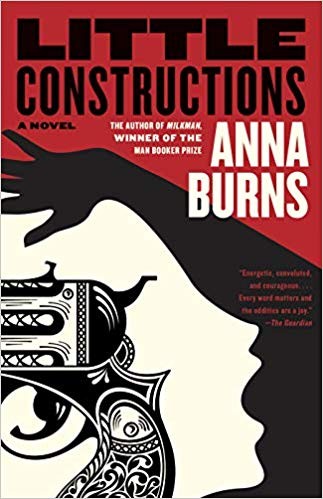
Little Constructions
A Novel
کتاب های مرتبط
- اطلاعات
- نقد و بررسی
- دیدگاه کاربران
نقد و بررسی

December 1, 2019
A coruscating tale of family and trauma first published in Britain in 2007 by the National Book Critics Circle Award- and Booker Prize-winning author of Milkman. Burns' Milkman was the surprise breakout literary novel of 2018: A story about one young woman's attempt to navigate Northern Ireland's Troubles, its style was challenging and at times maddeningly recursive but also showcased Burns' knack for black comedy and skill at conjuring an atmosphere of paranoia. In retrospect, this novel reads like a rehearsal for that triumph; it's a touch clunkier, at times more confusing than beguiling, but speaks to her ability to write about violence in powerful and unconventional ways. The story turns on the Doe family, whose gangster patriarch, John, is the sun around which various offspring, girlfriends, and hangers-on orbit. Most of them have names that start with "J"--Janet, Jetty, Jotty, Janine, Julie, Johnjoe, JerryJudges--which makes the relationships hard to parse. But the tactic is intentional; incest and other forms of sexual abuse are central (if slowly revealed) themes, underscoring how callously and interchangeably people (usually women) are treated. More directly, the story turns on Jetty, one of John's girlfriends, going on a mad spree to acquire a gun to exact revenge after feeling betrayed by him. Her actions set in motion a series of revelations about family and small-town secrets. The puckish, unnamed narrator explores this milieu with dark irony ("he was now initiating his first beating of a proper adult woman"). But Burns has deep reserves of empathy too, writing about one woman who stocks up on self-help books she's too terrified to read and depicting a family so consumed by "Noises" (i.e., memories of abuse) that it feels helpless. "Violence--and by the bucketload--kept the Noises away." Burns' style can make for tough sledding, but the intensity of her material justifies the effort.
COPYRIGHT(2019) Kirkus Reviews, ALL RIGHTS RESERVED.

December 16, 2019
Belfast native Burns’s raucous, exacting modernist crime novel (after the Booker Prize–winning Milkman) skewers men’s incomprehension of women. After a young woman named Jetty Doe confounds a gun shop owner in a town known as Tiptoe Floorboard by snatching a Kalashnikov rifle and throwing a pile of money at him
in pursuit of a crime of passion, shop owner Tom Spaders, already traumatized from being stabbed by teenagers in a mugging the year before, copes with the shock by blubbering to a friend about the woman’s apparent ignorance over the type of gun she’d wanted. The story then zigs and zags through a wild chronicle of the Doe crime syndicate and its core members’ immediate family, whose similar-sounding names—Jotty, John, Johnjoe, Janet, Janine, etc.—belie their complex, distinct identities (on Julie Doe: “This fifteen-year-old was older than her mother’s thirtysomething friend”). Burns’s narrator is a garrulous raconteur who drops in damning characterizations of men (“Why couldn’t she be quiet and just listen and remain quiet even after she’d listened?,” one wonders about his wife) while unspooling the freewheeling account of the Doe family’s occult superstitions, their quirky sensitivity to noises, and the bloody brouhaha that follows the arrest of several gang members. While the narrator’s digressive woolgathering will test some readers’ patience, the acerbic gender commentary tightens the slack. Burns’s fans will find much to chew on.

Starred review from January 1, 2020
Northern Irish novelist Burns, winner of the Man Booker Prize for Milkman (2018), creates word pictures and worldviews unlike anyone else writing today. Her second novel contains echoes of James Joyce in its use of quirky proper names (from the character Jetty Doe to the town of Tiptoe Floorboard) within a defiantly female perspective. Again Burns is concerned with the messy and tempestuous relationships of men and women, including the roots of domestic violence as well as the whole notion of abuse. We are introduced to the Doe family and their adventures by the distinctive and self-contained voice of the narrator, who seems just as surprised as the reader by the behavior of her fellow human beings. It does the novel no justice to describe its convoluted plot since the pleasure of the book and of Burns' work overall is falling under its weirdly compelling spell. Little Constructions is as dark and wild as Milkman and yet different, singular. Burns may not be for everyone, but those willing to dive in will most likely enjoy the ride.(Reprinted with permission of Booklist, copyright 2020, American Library Association.)

























دیدگاه کاربران